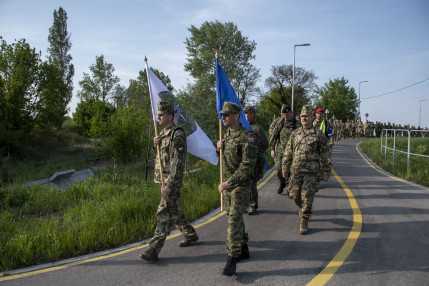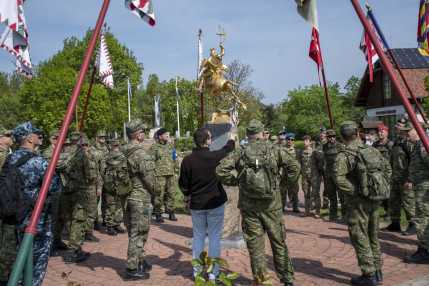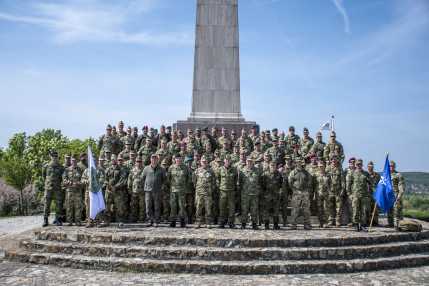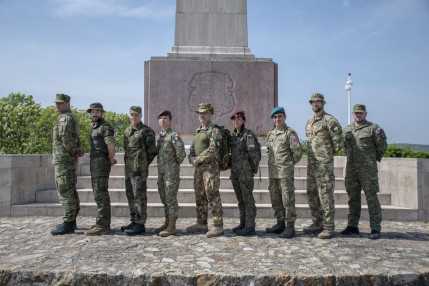HQ MND-C embarks on inaugural Military March, reflecting NATO’s enduring unity
Text: HQ MND-C | Photo: First Lieutenant Viktor Kapás | 11:23 April 17, 2024Established in 1949, NATO aims to safeguard its member states’ freedom and security through collective defence. With 32 member countries across North America and Europe, today the Alliance remains vital for our transatlantic security. Over the past 75 years, NATO has adapted to various security challenges, including the Cold War and counterterrorism. Its mission includes deterrence, crisis management, and cooperative security. The Alliance’s commitment to collective defence highlights the importance of unity among its members as well as the striving for peace, stability, and democratic values in the Euro-Atlantic region and on a global scale.

The Headquarters Multinational Division Centre (HQ MND-C) staff – representing ten nations – recently undertook their inaugural Military March from Kisfalud to the Military Memorial Park in Pákozd, commemorating NATO’s 75th anniversary and displaying this vital unity among member nations.
Led by the Command Senior Enlisted Leader, the preparation and organization of this event itself involved a wide range of tasks and required thorough internal coordination between different branches of HQ MND-C, and also with the HDF 51st Signal and Headquarters Support Brigade as well as with the county police, the local government and the Military Memorial Park in Pákozd.
Collective hardships and joint activities can bring together a team to maximalize its members’ potential and cooperation skills. Amidst Fejér County’s picturesque scenery and perfect weather, all participants felt good during the march, so we took advantage of the great atmosphere and asked some of our international colleagues about what they think about serving at the headquarters, navigating a multinational environment, and the significance of NATO’s milestone anniversary.

Major Angelo Cipolla (ITA) has already been abroad ten times in different NATO communities such as NATO Multinational Division South (MND-S) in Florence. Drawing from his broad experiences across various NATO units, he stressed the pivotal role of representation within HQ MND-C, saying: “It’s very important that the ten countries who are part of HQ MND-C have to represent their community and make themselves visible via presence.”
For Major Magdalena Szolomicka (POL), her first NATO assignment at HQ MND-C presented both challenges and opportunities for growth. She had taken part in many international exercises before, and is familiar with the NATO system and procedures. Here is what she said about her first NATO position: “Starting to work here was very challenging for me and sometimes it still gets so, but the feeling of gaining new experiences makes the hardships smaller and a little bit enjoyable. In a military career you should take your chance to get higher positions and learn new things.”
“It’s a great feeling to be part of NATO. I’ve grown up with the values, freedom, democracy and peaceful life which NATO gave us. These 75 years were a very long period with peace, and when you look up history books you won’t find a peacetime this long. As NATO soldiers, we must devote ourselves to protect and ensure this peace, safety and security for the future,” stated Lieutenant Colonel Markus Halassy (GER), a proponent of physical fitness and camaraderie, underscoring NATO’s role in preserving peace and democracy. He also thinks it is obligatory for soldiers to maintain their physical capabilities and strengthen their brothers-in-arms feeling through sports.

Our Romanian colleague, First Lieutenant Roxana Manolache is no stranger to multinational environments either. She has already participated in plenty of training events, exercises, and deployments before, and had the chance to take part in the “ERASMUS” programme during her cadet years. Highlighting the complexities of navigating diverse working environments, she said: “…the main obstacles are the different backgrounds and experiences; also, it is hard work to balance out the cultural and organizational culture differences between nations”.
Staff Sergeant Dario Šolić (CRO) feels that the language barrier can be difficult sometimes because English is not the first language for most people, and switching languages can cause struggle at times. This is his first NATO position at HQ MND-C, but he enjoys it. “I like working in a multinational environment, because I can see how others are dealing with problems and how they find solutions,” he said.
HQ MND-C plans to continue with this march and make it an annual event, allowing its nations to show their flags not only within their barracks but to their broader community as well.
The march culminated at the Military Memorial Park in Pákozd, where participants delved into Hungary’s rich military history, underscoring the Alliance’s commitment to preserving peace and security across borders, before returning to their duty stations.
